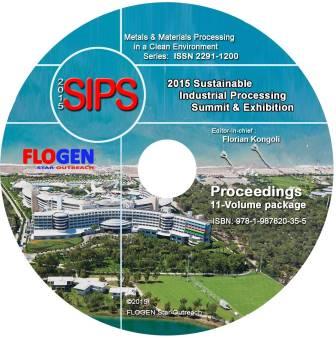2015-Sustainable Industrial Processing Summit
SIPS 2015 Volume 7: Ionic Liquids & Energy Production
| Editors: | Kongoli F, Gaune-Escard M, Mauntz M, Rubinstein J, Dodds H.L. |
| Publisher: | Flogen Star OUTREACH |
| Publication date: | 23 December 2015 |
| Pages: | 310 pages |
| ISBN: | 978-1-987820-30-0 |
| ISSN: | 2291-1227 (Metals and Materials Processing in a Clean Environment Series) |

< CD shopping page
Thermodynamic Database for Molten Salt Reactor Fuel
Ondrej Benes1;1JRC-ITU, Karlsruhe, Germany (Deutschland);
Type of Paper: Regular
Id Paper: 158
Topic: 13
Abstract:
Molten Salt Reactor is one of the future reactor concepts considered in the Generation IV technology. The main characteristic of such reactor that differs from the other concepts is the physical nature of the fuel which is liquid. The fuel must fulfill several requirements in terms of its physical properties and neutronics and the most promising candidates seem to be molten fluoride salts, including the alkali fluoride matrix with dissolved actinide fluorides. Since the fuel is a multi-component system, for practical reasons it is very important to have a thermodynamic database that describes many of relevant physico-chemical properties for all possible compositions thus making it possible to optimize the fuel selection. At JRC-ITU, a thermodynamic database that describes most relevant systems of the molten salt reactor fuel has been developed in the past decade including both modelling of phase equilibria and experimental work. Especially the latter one has been a challenging task as it required a full development of a technique that made it possible to handle actinide containing fluoride salts at high temperatures during the measurements. In this paper, we will highlight the techniques used and we will show the latest results obtained using calorimetric and mass spectrometric facilities. It will be shown how these data are successively used to model the phase diagrams of studies systems and how the resulting database is applied to optimize the fuel composition with respect to its criteria, mainly the melting temperature. We will also show how useful the database is in predicting the properties of a fuel salt containing fission products which are accumulated during the reactor operation.